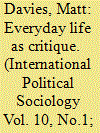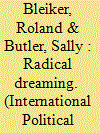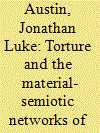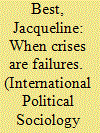|
|
|
Sort Order |
|
|
|
Items / Page
|
|
|
|
|
|
|
| Srl | Item |
| 1 |
ID:
145115


|
|
|
|
|
| Summary/Abstract |
The authors in this collective discussion engage, disaggregate and unpack the triangulation of security, technology and architecture, across a range of contemporary spaces/places. Reflecting diverse interdisciplinary commitments and perspectives, the collective discussion considers security, technology and architecture in urban environments and global/local interfaces, borders, borderlands and ports of entry, and even the sensorium, from soundscapes of the airport to teargas laden environments. From quotidian to high-tech, these interventions tease out the increasing ferocity of architecture and/in its relationship with technology and security.
|
|
|
|
|
|
|
|
|
|
|
|
|
|
|
|
| 2 |
ID:
145112


|
|
|
|
|
| Summary/Abstract |
This article argues that critical International Political Economy (IPE) has used an undertheorized notion of everyday life and that Henri Lefebvre’s approach to everyday life, when augmented by attending to specifically colonial modes of domination, provides a necessary theoretical basis for IPE to engage with the everyday. It thus explores the connections between critical IPE, the critique of everyday life, and postcolonial thought. It begins by examining the “turn” to the everyday in IPE, examining the consequences of its reliance on an untheorized notion of the everyday. Lefebvre’s critique of everyday life is then examined to address these shortcomings. But Lefebvre’s provocation about the colonization of the everyday also requires greater conceptual clarity. Thus, the article goes on to examine the affinities between postcolonial thought and the critique of everyday life. This underscores the indispensability of Lefebvre’s critique in terms both of everyday life and of the international as constituted by colonization.
|
|
|
|
|
|
|
|
|
|
|
|
|
|
|
|
| 3 |
ID:
145114


|
|
|
|
|
| Summary/Abstract |
We examine links between art and foreign policy through two important instances of cultural diplomacy in Australia’s history. Each time—in 1941–1942 and in 2009—the government staged an extensive exhibition in the United States. Each time, the exhibition displayed Indigenous art with the explicit purpose of increasing Australia’s political legitimacy and influence. But in each case, the artworks in question resisted and subverted this form of diplomatic instrumentalization. Art managed to insert and communicate political claims that highlighted—against governmental intentions and policies at the time—the suppression of Indigenous rights and demands for sovereignty. In doing so, art challenged not only legal and political norms but also an entire verbal and visual narrative of nation building that emerged out of colonialism. Art thus became political in the most fundamental way, for it directly interfered with what Jacques Rancière called the distribution of the sensible: the boundaries of what is visible and invisible, is thinkable and unthinkable, and thus, can and cannot be debated in politics.
|
|
|
|
|
|
|
|
|
|
|
|
|
|
|
|
| 4 |
ID:
145111


|
|
|
|
|
| Summary/Abstract |
The intimately local violence of torture is, simultaneously and increasingly, a global phenomenon. This paper explores a transnational convergence in the local morphologies of torture practices across time, space, and state-type through an inquiry into its global ontologies. Drawing on the insights of Actor-Network Theory, the papers introduces a material-semiotic mode of inquiry into violence in order to locate the (re)emergence and (re)convergence of torture practices within a hitherto unnoticed space of violence constituted by the circulation of violence-enabling knowledges, visual and textual inscriptions, human persons, and non-human material objects. This analysis is based on evidence gathered from interviews conducted with Syrian victims and perpetrators of torture, alongside primary and secondary sources detailing torture in other localities, which stresses the importance of tracing local instances of torture through to these material-semiotic networks of violence across borders. Concluding with a theory of the spatio-temporal oscillation of violent practices, which highlights the analytical limits of both the constructivist literature on norms and the decisionism of literatures on political exceptionalism, the paper argues that its mode of inquiry provides novel and important insights for comprehending the stubbornness of the “global crisis” in torture that Amnesty International has described for over forty years.
|
|
|
|
|
|
|
|
|
|
|
|
|
|
|
|
| 5 |
ID:
145113


|
|
|
|
|
| Summary/Abstract |
What happens if we look at events like the 2007-2008 financial crisis not just as crises but also as failures? This shift is a productive one, opening up new ways of understanding the debates and policy responses that followed the recent crisis. For this was not just a crisis: it was also a spectacular failure. Moreover, it was a contested failure: the kind of failure that made key actors question the metrics through which they measured success and failure. Through a comparative analysis of recent failures in international development and international finance, this paper argues that looking at these crises as contested failures provides us with a better understanding of the epistemic underpinnings of certain crises and the politics of the responses to them. Focusing on failure also allows us to see that policymakers have become more preoccupied with the possibility of failure in the aftermath of these crises—and that they have become increasingly cautious in response. This paper concludes by exploring the implications of the increasing prevalence of “fail-safe” approaches to policy, a cautious approach to policymaking that may in fact increase the odds of future failures.
|
|
|
|
|
|
|
|
|
|
|
|
|
|
|
|
|
|
|
|
|